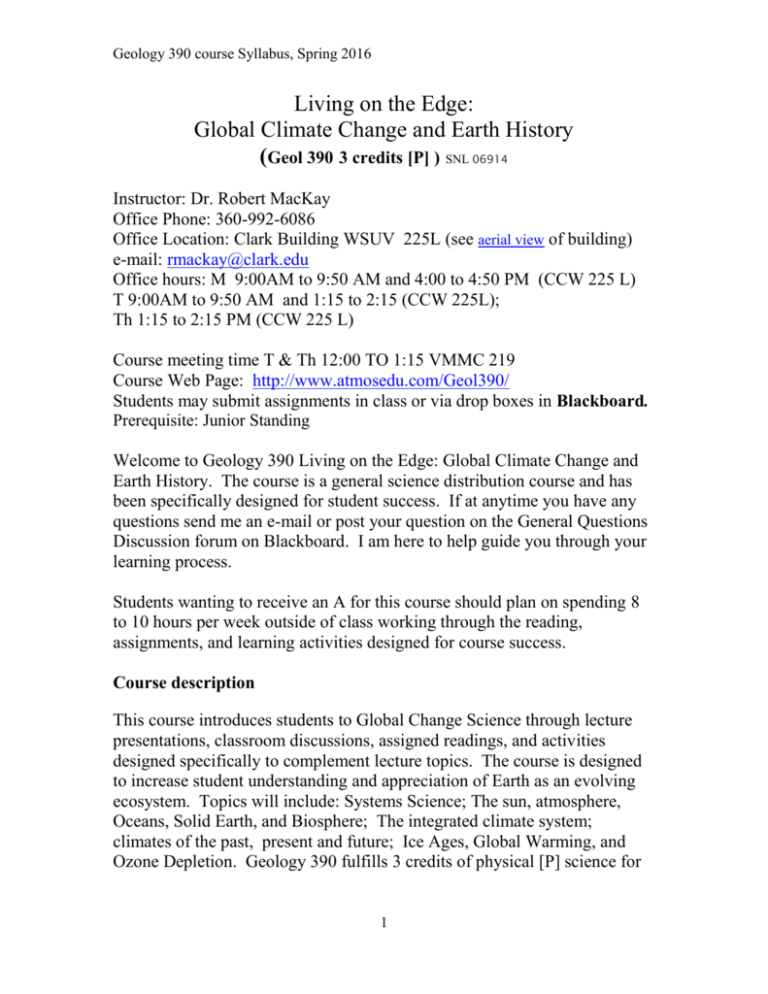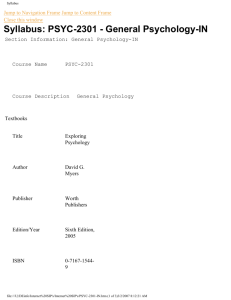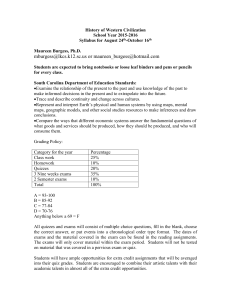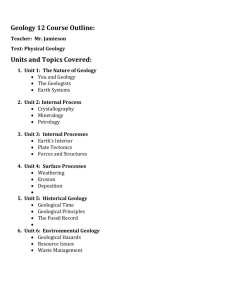Syllabus - Dr. Robert MacKay
advertisement

Geology 390 course Syllabus, Spring 2016 Living on the Edge: Global Climate Change and Earth History (Geol 390 3 credits [P] ) SNL 06914 Instructor: Dr. Robert MacKay Office Phone: 360-992-6086 Office Location: Clark Building WSUV 225L (see aerial view of building) e-mail: rmackay@clark.edu Office hours: M 9:00AM to 9:50 AM and 4:00 to 4:50 PM (CCW 225 L) T 9:00AM to 9:50 AM and 1:15 to 2:15 (CCW 225L); Th 1:15 to 2:15 PM (CCW 225 L) Course meeting time T & Th 12:00 TO 1:15 VMMC 219 Course Web Page: http://www.atmosedu.com/Geol390/ Students may submit assignments in class or via drop boxes in Blackboard. Prerequisite: Junior Standing Welcome to Geology 390 Living on the Edge: Global Climate Change and Earth History. The course is a general science distribution course and has been specifically designed for student success. If at anytime you have any questions send me an e-mail or post your question on the General Questions Discussion forum on Blackboard. I am here to help guide you through your learning process. Students wanting to receive an A for this course should plan on spending 8 to 10 hours per week outside of class working through the reading, assignments, and learning activities designed for course success. Course description This course introduces students to Global Change Science through lecture presentations, classroom discussions, assigned readings, and activities designed specifically to complement lecture topics. The course is designed to increase student understanding and appreciation of Earth as an evolving ecosystem. Topics will include: Systems Science; The sun, atmosphere, Oceans, Solid Earth, and Biosphere; The integrated climate system; climates of the past, present and future; Ice Ages, Global Warming, and Ozone Depletion. Geology 390 fulfills 3 credits of physical [P] science for 1 Geology 390 course Syllabus, Spring 2016 general education requirements (GERs). It does NOT fulfill any requirements for laboratory [L] credit. Required Materials. Text Book: The Earth System Kump, Kastings, and Crane, 3rd edition. A calculator that adds, multiplies, and divides Access to MS Word, Excel, and PowerPoint or open office suite (free) [http://download.openoffice.org/] When submitting written work save your files in MS Word .doc format (or docx) or .pdf format whenever possible. Also try to name your files without any spaces. Example ThisFile.doc as opposed to This file.doc. Questions: Posting questions on the Blackboard discussion board (General questions about the class) is a great way to go as some of your fellow classmates may have some good ideas. Sending me an e-mail directly is also a good way to get questions answered fairly quickly. Assessment: 2- Exams (30%) + Final (20%): 50% for all exams Research Paper (20% )(See Research paper for specifics) Homework & in-class activities/ quizzes (30 %) see Homework for details of homework assignments and due dates. B+ 90-87% C+ 80-77% D+ 70-67% A (100-93%) B 87-83% C 77-70% D 67-63% F less than 60% A- 93-90% B- 83-80 % D- 63-60% Exams: The readings, homework, and quizzes are meant to prepare you for exams. The idea is to go back over these things to solidify your knowledge and understanding. Exam study guides include sample exam questions and should be studied. 2 Geology 390 course Syllabus, Spring 2016 Tentative Schedule Week # 1 Jan 12 &14 2 Jan 19 & 21 3 Jan 26 & 28 4 Feb 2 & 4 5 Feb 9 & 11 6 Feb 16 & 18 7 Feb 23 & 25 8 Mar 1 & 3 9 Mar 8 & 10 Chapter/Topic Ch1 Introduction and over view Ch2 Systems / Daisy World Ch3 Energy Balance & Greenhouse Effect Ch4 The atmosphere Exam #1 Tuesday Feb 9 Ch5 Oceans Hydrologic Cycle Ch6 Cryosphere Ch7 Plate Tectonics/ Volcanoes Exam #2 Thursday Mar 10 (chapter 4 (water cycle) through chapter 7) Mar 14 thru 18 10 Mar 22 &24 Spring Break Ch 8 Carbon cycle 11 Mar 29 &31 Ch 12. Long term Climate regulation Cracking the ice age Ch 14 The Pleistocene Energy challenges (Unit 10 Habitable Planet) Ch15. Holocene and recent and future climate Ch 16. Impacts , Adaptation, Mitigation Ch17. Ozone Depletion 12 Apr 5 & 7 13 Apr 12 & 14 14 Apr 19 & 21 15 Apr 26 & Apr 28 Finals weeks Final Thurs May 5 11:00 to 1:00 VMMC 219 3 Geology 390 course Syllabus, Spring 2016 Course Learning Objectives (LO) After completing this course students will be able to: LO1 define and explain fundamental terminology, principles, and relationships related to Earth’s climate system. LO2 compose reports, essays, and paragraphs to express their understanding of key topics related to the Earth’s climate system using appropriate written and visual communication skills. Course topics and dates that address these learning outcomes are: This outcome will be assessed primarily by: Jan 12 through Apr 28 (all topics). Jan 12 through Apr 28 (all topics). Exam # 1 and Exam #2 Research Paper Research Paper Critical thinking from Chapter 1 Daisy World video summary Peter Cox lecture summary Reading Summary “the efficiency Dilemma” Video Summary Our Energy Challenge CO2 assignment CFC assignment LO3 demonstrate their ability to work and think independently and to work and think within a team or larger group. Jan 12 through Apr 28 (all topics). LO4 Employ graphs (x-y Jan 12 through Apr 28 scatter plots and bar (all topics). graphs, and contour plots) to demonstrate and examine important relationships within the Earth system. LO5 analyze issues, claims, and situations related to climate change science Jan 12 through Apr 28 (all topics). 4 Research Paper In-class group work Assignments where working together is okay promotes team work Individual writing assignments assess independent thinking. Research Paper Graphing Exercise Dasiy World Assignment Water Bucket Model Assignment CO2 assignment CFC assignment Stratospheric Oze Critical thinking from Geology 390 course Syllabus, Spring 2016 using appropriate scientific methodology. They will identify information that is important to a specific problem from extraneous information and distinguish between fact and opinion. Ideas related to the carbon cycle, global warming, and stratospheric ozone depletion will be highlighted in the course for critical student analysis. Chapter 1 Daisy World video summary Peter Cox lecture summary Reading Summary “the efficiency Dilemma” Video Summary Our Energy Challenge In their research paper CO2 assignment students are expected to CFC assignment critically evaluate Research paper claims related to climate change science. (Due April 19) Class Policies Each student is expected to be courteous to others and observe the rules and regulations of the college at all times. Attendance Attendance and punctuality are essential for success in this class as well as being a lifelong learning skill. Each student is expected to attend class sessions regularly. If you do miss a session it is your responsibility to obtain all assignments and/or handouts. In addition, it is your responsibility to make sure that you learn the material covered in class. No makeup points will be given for missed quizzes or other in-class activities so attendance is important. Class Participation Each student is expected do all class activities. The course is designed to provide scaffolding early in the quarter to build skills and knowledge needed later in the quarter. The exams will typically be based on topics that are included in readings, online videos, Powerpoint summaries , online quizzes, and labs. The University faculty and administration agree that for every one hour in class students should be spending 2 to 3 hours outside of class working on learning activities (reading, writing, homework). With this in mind, expect to spend approximately 9 to 12 hours a week total on the 5 Geology 390 course Syllabus, Spring 2016 course if you are aiming for an A grade. Don’t fall behind, as it is very difficult to catch up. It is important to maintain a safe learning environment by showing unconditional respect for others. One must be particularly careful when communicating electronically as often the written word can be perceived differently than intended. This is demonstrated by being respectful of others and their opinions, taking one another seriously, and allowing humor to be a part of the class. Entering into class discussions and asking questions is important but try to be extra courteous to others and their opinions. Chapter Reading: Although we do not intend to cover all chapters in our text this semester we will cover many of them fairly closely so reading through these chapter is important. Use the bold terms identified through each chapter as a study guide. Whenever we plan on only covering only part of a chapter, the important bold terms from the chapter will be specified. As a general guideline for studying the material presented in a chapter: first make sure you know all these bold terms in a given chapter and concepts related to them; second browse through the review questions to see if they make sense. Feel free to ask questions in class at anytime about review questions or any other ideas presented in our text or in lecture. Exam Policy To assess student understanding of reading and ideas presented in class or through assignments periodic quizzes and exams will be given. No make-up quizzes are given. If a students does miss one quiz they will be given a grade based on the average of all other quiz and exam scores (including the final) for the missed quiz. If for some reason, such as a field trip or other academic or professional activity, a student must miss class, advance notice should be given to the instructor so that exams may be scheduled around such activities. Make-up exams will be given only in extreme situations and at the discretion of the instructor. Make-up exams will not be given to a student missing more than 4 classes throughout the semester. Any make-up exam will be given during the last week of classes. Late home work will be accepted with a 10 % penalty for up to 24 hours late, 20% penalty for 24 to 48 hours late, and 50% penalty for more than 48 hours late. Homework received after it has been graded for the class will 6 Geology 390 course Syllabus, Spring 2016 not be accepted. The extra credit option discussed below allows you to "make-up" missed assignment points. Homework will not be counted late it if is received by 11:59 PM on the due date. Homework is usually submitted through Angel. WSU Academic Integrity Academic integrity is the cornerstone of the university. You assume full responsibility for the content and integrity of the academic work you submit. You may collaborate with classmates on assignments, with the instructor's permission. However the guiding principle of academic integrity shall be that your submitted work, examinations, reports, and projects must be your own work. Any student who violates the University's standard of conduct relating to academic integrity will be referred to the Office of Student Conduct and may fail the assignment or the course. You can learn more about Academic Integrity on your campus using the URL listed in the Academic Regulations section or to http://conduct.wsu.edu/academic-integrity-policies-and-resources. Please use these resources to ensure that you don’t inadvertently violate WSU's standard of conduct. Extra Credit Students will be given some opportunity for extra credit which can increase their overall grade by up to 5 percentage points. If a student is interested in developing their own extra credit activity/research project related to a particular aspect of Earth system science please talk with your instructor. Writing summaries of papers, essays or books related to Earth system science of particular interest to you are worth up to 1 % of your overall grade each. See Paper Summary for guidelines and articles or articles2 for some possible ideas. Students may also submit a YouTube video summary of the choice for up to 0.6 % extra credit (~ 6 pts). See YouTubeVideo Summary for more details. All Extra credit must be submitted by Friday April 29 for consideration. Disability Services - Students with Disabilities: Reasonable accommodations are available for students with a documented disability. If you have a disability and need accommodations to fully participate in this class, please either visit or call the Access Center (Washington Building 217; 509-3353417) to schedule an appointment with an Access Advisor. All accommodations MUST be approved through the Access Center. For more information contact a Disability Specialist on your home campus: All 7 Geology 390 course Syllabus, Spring 2016 accommodations must be approved through Disability Services, located in the Student Resource Center on the Lower Level of Student Services Center (360) 546-9138 http://studentaffairs.vancouver.wsu.edu/student-resourcecenter/disability-services . Safety and Emergency Notification WSU has made an emergency notification system available for faculty, students, and staff. Please register at zzusis with emergency contact information (cell, email, text, etc.). You may have been prompted to complete emergency contact information when registering for classes at RONet. In the event of a building evacuation, a map at each classroom entrance shows the evacuation point for each building. Please refer to it. Finally, in case of class cancellation campus-wide, please check local media, the WSU Vancouver web page and/or http://www.flashalert.net/. Individual class cancellations may be made at the discretion of the instructor. Each individual is expected to make the best decision for their personal circumstances, taking safety into account. Safety plan website. 8









